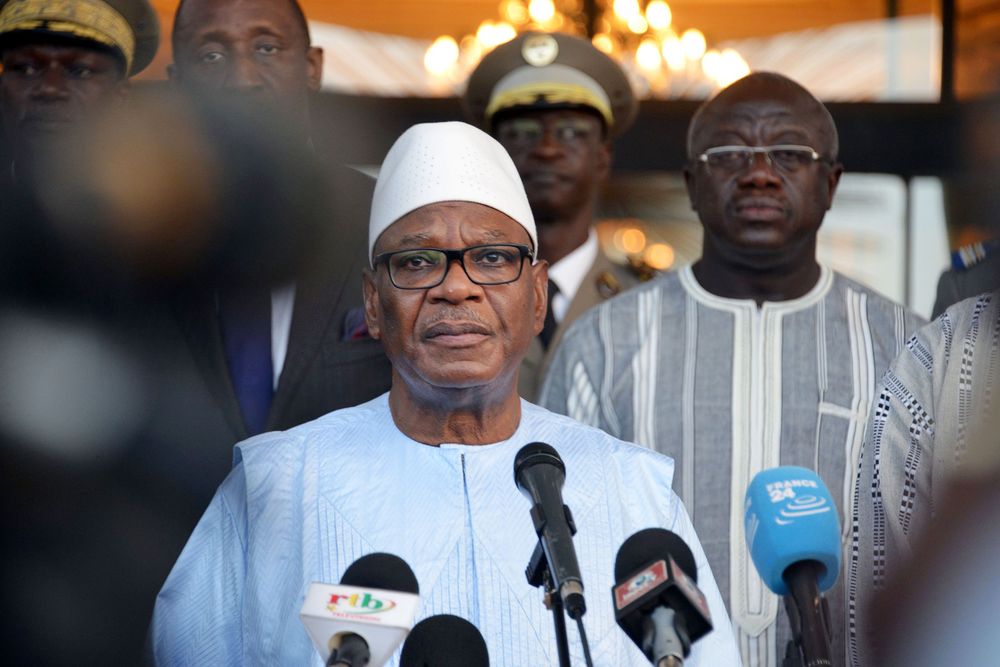
Foreign travel is the first thing that comes to mind when Malian lettuce farmer Moussa Samake thinks about President Ibrahim Boubacar Keita.
Nicknamed “the carrier pigeon” for his frequent trips abroad, Keita, 73, is expected to seek re-election in July after a five-year term marred by growing insecurity in the landlocked West African nation. His failure to halt a steady rise in deadly jihadist attacks has left many Malians disillusioned and the region at risk of further instability.
“Frankly, I don’t see what good he has done,” Samake, 33, said as he sat in the shade of a tree, drinking tea with friends in the capital, Bamako. “He said he would stabilize and pacify our country. There’s been none of that. I only see that he travels abroad all the time.”
Al-Qaeda-linked Islamist militants have expanded their influence from the desert north to the more densely populated center and across the borders, carrying out near-daily attacks on Malian troops and United Nations peacekeepers. Raids on luxury hotels have all but killed tourism in the country that’s home to the historic desert city Timbuktu.
Country in Tatters
“Keita is extremely unpopular,” said Mahamadou Konate, a political analyst at the School of Peacekeeping Alioune Blondin Beye in the capital, Bamako. “We all thought he was the man who could get us out of this mess. Instead, he’s been a powerless witness to the deterioration of the security situation throughout the country.”
In 2013, Keita inherited a country in tatters. A separatist revolt in the north and a subsequent army coup had triggered Mali’s collapse a year earlier. While the country had been upheld by donors as an exemplary democracy, the ousting of then-President Amadou Toumani Toure unveiled rampant corruption among Mali’s elite.
Months after a French military intervention pushed back the insurgents, Keita, a former prime minister, won an election by a landslide on pledges to restore state authority nationwide. His victory unlocked about $4 billion in aid, leaving Malians hopeful that the worst was over.
Since then, hundreds of Malian soldiers and UN peacekeepers have died in bombings and hit-and-run attacks, and at least 400 schools closed under pressure from jihadists. Mali’s crisis has spilled over into neighboring Burkina Faso and Niger, and prompted the creation this year of a 5,000-strong regional military force to fight the militants. And the implementation of a 2015 peace accord with separatist insurgents in Mali’s north is faltering.
Cabinet Changes
Allegations of corruption and frequent cabinet changes — Mali has had five prime ministers in as many years — have further undermined Keita’s reputation. Social discontent reached a peak last year when he submitted a proposal to change the constitution that would have expanded his powers. He withdrew the plan after tens of thousands of people took to the streets in the biggest protest in decades, demanding he step down.
“The huge number of people that showed up signaled a general exasperation with our leadership,” said Ras Bath, one of the protest’s organizers. “It wasn’t only about the constitution — people wanted to say they don’t have water, electricity, or work.”
While acknowledging that people are killed almost daily in militant attacks, Keita told the weekly magazine Jeune Afrique in December that Bamako is as safe as Paris or Las Vegas. He also said the national air force has been “reborn” under his watch and rejected allegations of corruption and nepotism.
Expanding Economy
Gross domestic product is expected to expand 5 percent this year, compared with 5.3 percent in 2017, according to the International Monetary Fund. Mali exports gold and is Africa’s biggest cotton producer.
There’s concern about the July vote as well, with Mali’s media speculating that it may be postponed because of the security situation. While it’s unlikely that the vote can take place in high-risk regions including Kidal and Timbuktu, the head of the UN peacekeeping mission, Mahamat Saleh Annadif, said in an interview it’s necessary that the presidential vote goes ahead.
“There is a constitutional deadline,” Annadif said. “We wouldn’t like to add another crisis to the crisis.”

